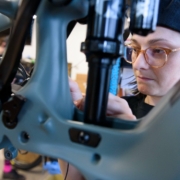Utah is winning in the regional competition for manufacturing prominence. Here’s how a new hierarchy is shaping up in the West
Four years ago I wrote that in the regional competition between the Rocky Mountain look-alikes to attract manufacturing business and economy, the outcome would likely come down to Utah’s workforce advantage vs. Colorado’s “high-velocity food and beverage business.”
Today, the big news is Utah’s success.
By the numbers, Utah is a manufacturing juggernaut. A study by Economic Innovation Group released in October concluded that Utah led the nation in manufacturing job growth between 2019 and 2023, adding over 16,000 jobs — roughly a 12 percent increase.
Moreover, EIG surmised that nationally, “Utah was among the five states that accounted for two-thirds of the sector’s job growth, including Texas, Florida, Georgia and Arizona.” In September this year, Bureau of Labor Statistics (BLS) data measured manufacturing employment in Utah at 154,900 jobs — up from 138,000 or so in September of 2019.
Colorado manufacturing employment has leveled off, for now. The BLS measures current manufacturing employment at 150,600 jobs — a decrease from a post-pandemic high of 154,000 jobs in August of 2022 and flat from the same month in 2019, if not down a smidge from 150,900. The Colorado Chamber of Commerce also reported this week that the number of manufacturing businesses has declined in the state, from 6,210 to 6,163.
In part, Colorado’s white-hot food economy, the largest manufacturing employer in the state, has cooled. The well-respected Colorado Business Outlook and Forum is forecasting net job losses for the sector when the dust settles in 2024 and modest growth in 2025. Colorado’s transformative craft beer sector, long a dependable engine of growth, is also slogging through a nation-wide reset in the brewing and spirits industry.
Fortunately, what’s painful today will likely usher in a new growth phase. Until it does, Utah is assembling all the pieces to win the competition for manufacturing companies and jobs. It likely starts with workforce.
I wrote in 2020 that, “Utah’s workforce advantage is a beacon for manufacturers. Simply, the state’s developing the next-generation talent manufacturers need — educated, tech-savvy and capable but also shaped positively by Utah’s cohesive community. Many leave on Church of Jesus Christ of Latter-day Saints missions, but return often fluent in another language, motivated and exposed to the world, to start careers and families.”
Today, the state has also become a model for how economic developers and federal and local resources collaborate to support manufacturers. The Utah Manufacturers Association, the federally supported Utah Manufacturing Extension Partnership (or MEP), eco-devo groups like iMpact Utah, and state government including the Governor’s office, provide unique, complimentary services in the manufacturing value-chain — with the success of the entire ecosystem in mind. And Utah Governor Spencer Cox is deliberately cultivating a pro-manufacturing brand.
Utah, Texas, and Arizona are leading an advanced manufacturing comeback in key industries like transportation (including aerospace and automotive) and the emerging semiconductor supply chain. Manufacturers are locating there to find workers, deliberate support, and a pro-business climate.
In Utah, they’re also finding success.
Bart Taylor is a Moss Adams BDE and former publisher of CompanyWeek Manufacturing Media. Reach him at bart.taylor@mossadams.com.

